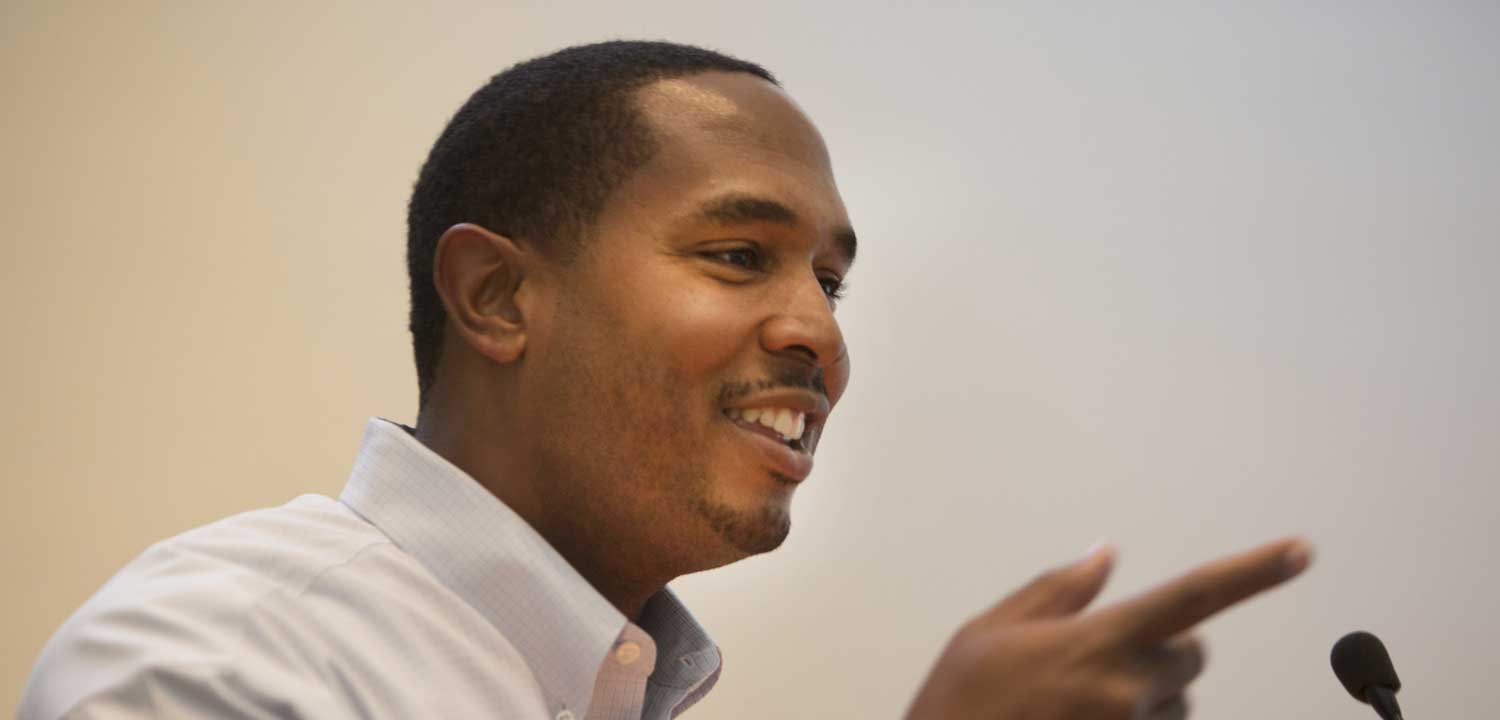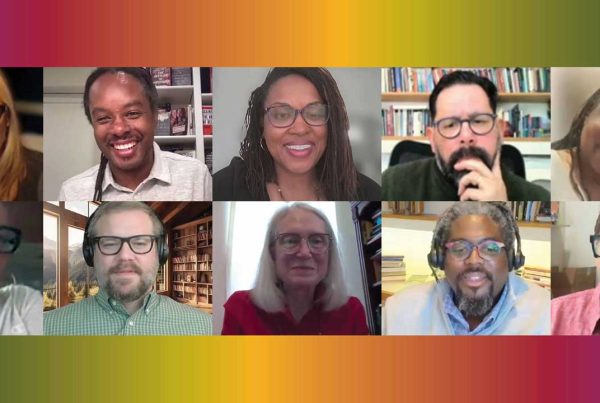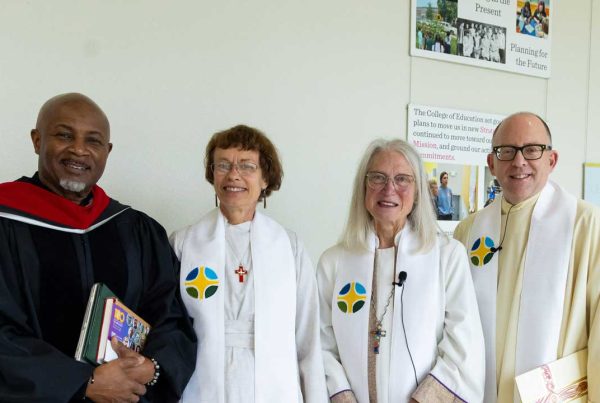James Jackson (DMin ’24, MDiv/MACMHC ’12): Bridging Faith, Mental Health, and Community
James O. Jackson, II wears many hats, and he wears them well. With multiple roles in the central Indiana community, his impact is both diverse and profound. Jackson, a three-time alumnus of Christian Theological Seminary (CTS), recently completed his Doctor of Ministry (DMin) degree after defending his thesis. His academic journey began with dual degrees in the Master of Divinity (MDiv) and the Master of Arts in Clinical Mental Health Counseling (Psychotherapy and Faith) programs at CTS.
Jackson’s decision to pursue both degrees at CTS was guided by a strong sense of calling and purpose. “I chose to attend Christian Theological Seminary for my initial degrees… because I felt a clear call to ministry and a deep desire to prepare both my mind and heart for the work ahead,” he shares. His decision to pursue the dual degree path allowed him to combine his calling to the church with his interest in chaplaincy—specifically military and hospital chaplaincy, which he describes as “a ministry of presence that provides a calm and non-anxious presence in spaces where people are in need.”
What set CTS apart for Jackson was the alignment with his personal values. “CTS stood out to me because of its progressiveness, commitment to social justice, and academic rigor, all of which aligned with my vision for ministry and personal growth,” he explains. “It was the ideal environment for me to develop the theological and pastoral skills necessary to serve others effectively.”
Jackson’s decision to pursue the DMin program at CTS was driven by his evolving sense of purpose and the urgency of addressing mental health issues in the Black church. “My life’s mantra, ‘seek God, unite with others, and serve the world,’ continues to guide my journey,” he says. “This pursuit of purpose and wholeness is what brought me to CTS initially and inspired me to return for the DMin program.”
The COVID-19 pandemic, which intensified the global mental health crisis, was a significant motivator for Jackson’s return to CTS. He recognizes how the pandemic exacerbated existing mental health challenges, particularly within the Black church and community. “This issue was particularly severe within the Black church and Black community, where the need for mental health support became even more urgent,” he notes. With his background in chaplaincy and psychotherapy, Jackson saw an opportunity to bridge this gap.
He continues, “The DMin program also offered a chance to integrate my diverse interests—ministry, psychology, neuroscience, chaplaincy, agronomy, and biology—into a unified approach that could not only pull together all the parts of my expertise but also provide transformative support to those in need.”
Jackson’s dissertation research, which focused on the integration of mental health counseling within the Black church, will remain central to both his ministry and counseling practice. “The work of my dissertation will remain central to both my ministry and counseling practice as I continue to bridge the gap between mental health care and the Black church,” he shares. “Exploring the perceptions of a mental health counseling ministry in a Black church gave me valuable insight into the barriers, cultural dynamics, and opportunities for integrating faith and therapy.”
Going forward, Jackson plans to use his findings to advocate for culturally competent, spiritually sensitive mental health services within Black church communities. He emphasizes the importance of equipping pastors and church leaders to address mental health stigma, promote awareness, and create spaces where faith and therapy can support healing and wholeness.
“This work is more than academic; it’s a reflection of my calling and commitment to serve at the intersection of faith and mental health in the Black church and community,” he says. His goal is to continue this mission through workshops, panel discussions, sermons, and counseling sessions, reducing stigma, increasing education, and practicing cultural competency.
In addition to his academic and ministerial work, Jackson’s professional career further exemplifies his commitment to service. As a neuroscientist at Indiana University School of Medicine (IUSM), Jackson serves as the Director of Research Facilities and Operations. His team supports research infrastructure for several IUSM facilities, advancing health and wellness on a global scale.
But Jackson’s calling does not stop in the academic and scientific realms. He also serves as an associate pastor and mental health counselor, focusing on the needs of the Black church and community. He is a resident therapist at Christian Theological Seminary’s Counseling Center and a therapist at Hamilton Center, Inc., a community mental and behavioral health organization.
“By integrating my expertise in neuroscience, counseling, and ministry, I provide a holistic approach to healing that addresses the physical, emotional, and spiritual needs of those I serve,” Jackson explains. His work, deeply rooted in faith and cultural competency, is helping to address critical gaps in mental health care in the Black community. He adds, “Spiritually integrated psychotherapy has been especially impactful, helping individuals connect their faith with their mental health, fostering resilience, hope, and meaningful transformation.”
Reflecting on his time at CTS, Jackson highlights his doctoral defense as a favorite memory. “One of my favorite memories from my time at CTS is the day of my doctoral defense,” he recalls. “It was the culmination of years of thinking, reading, writing, designing, data collection, and data analysis. That day, I had the opportunity to present the work I was deeply passionate about.”
The defense itself was a collaborative process, as Jackson engaged with his committee. “What made the experience truly exhilarating was fielding questions from my committee—Dr. Rickey McCray, Dr. Scott Seay, and Dr. Nicole Robertson, my Committee Chair—and discovering connections and insights during the discussion that I hadn’t previously considered.”
When asked about his mentors, Jackson highlights Dr. Nicole Robertson’s invaluable guidance throughout his journey. “We shared countless conversations and meetings to discuss the direction of my research, and she consistently served as both a sounding board and a wellspring of wisdom—not only for my academic work but also in my work/life balance and professional development,” he says.
Jackson’s work as a resident therapist at the CTS Counseling Center has also been transformative. “My work as a resident therapist at the CTS Counseling Center has been both eye-opening and inspiring,” he shares. The center has provided Jackson with the experience needed to serve his community, particularly as more Black and Brown individuals seek therapy from him. “More Black and Brown individuals are intentionally seeking me out, sharing that they appreciate my cultural competency and the representation I bring as a therapist who looks like them,” he explains.
The CTS Counseling Center itself plays a crucial role in the mental health landscape of Indianapolis. “It’s a lifeline, particularly for those who might otherwise be unable to afford therapy,” Jackson notes, emphasizing the importance of the center’s sliding scale fee structure.
As Jackson moves forward in both his ministry and counseling work, his mission remains clear: to address the mental health needs of the Black church and community. He is committed to continuing his advocacy, research, and direct service, helping to reduce stigma, increase awareness, and promote healing in spaces where faith and therapy intersect.
Through his work, Jackson embodies the integration of faith and science, creating a holistic approach that empowers individuals to heal and thrive. His journey is a testament to the power of combining scholarship, faith, and a passion for service.






